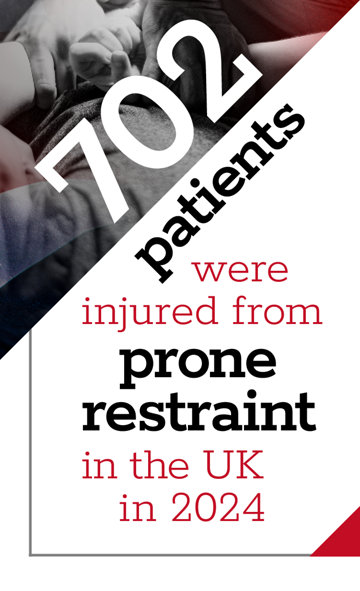His parents took him to London’s Bethlem Royal Hospital, a psychiatric hospital also known as Bedlam, where he voluntarily checked himself in.
But once his parents left, Seni changed his mind and wanted to leave, at which point he was restrained by 11 personnel, who cuffed him, put him in a padded cell, placed him in leg and ankle restraints, held him face down and beat him with a baton.
When he fell unconscious due to restricted breathing, his abusers decided he was faking and left him there. Later, at Mayday Hospital, Olaseni was adjudicated brain dead, and his life support system was turned off.
“Without accountability, human rights lack enforcement and are rendered meaningless.”
“Prone restraint,” wherein the victim is forced face down on a bed or on the floor—the procedure that killed Olaseni Lewis—is bad. And the right people know it’s bad. In 2014, the UK’s coalition government stated that prone restraint “can result in dangerous compression of the chest and airways and put the person being restrained at risk.” They told mental health units in England to phase it out.
Four years later, Parliament passed the Mental Health Units (Use of Force) Act of 2018, more familiarly known as Seni’s Law, banning forever the “disproportionate and inappropriate” use of any type of restraint.
Three years later, in 2021, government guidelines specifically directed that “there must be no planned or intentional restraint of a person in a prone or face-down position on any surface.”

Never again would such an atrocity be perpetrated on a person seeking treatment for mental health.
At least, that was the idea.
How has the UK psychiatric community responded to these in-your-face directives to just say no to prone restraint?
According to recent figures from the National Health Service, in the first 10 months of 2024, prone restraint was used 3,732 times in UK mental health facilities with 702 patients injured. Clearly, the message hasn’t gotten through.
In October 2023, the United Nations weighed in on psychiatry’s practice of violently punishing those who seek its “help.”
In its guidance on mental health, human rights and legislation, it condemned psychiatry’s coercive practices and called on governments to “commit by law to a ‘zero coercion policy in mental health care.’”
After affirming the human rights of those in mental institutions, the UN guidelines contain this key passage: “Accountability is an important component of the human rights framework. Without accountability, human rights lack enforcement and are rendered meaningless.”
True enough. Psychiatry’s forced infliction of electroshock (which the UN has dubbed “torture”), psychotropic drugs (and their side effects ranging from delusions to suicide) and entrapment and restraint by various medieval means on innocent human beings are all, in themselves, “disproportionate and inappropriate.”
As it stands now, possibly the framed certificates on their walls are the only thing that stand between psychiatrists and jail time for willful and premeditated torture.
A Department of Health and Social Care spokesperson said: “This data is incredibly concerning. Patient safety is paramount, and anyone receiving treatment in an inpatient mental health facility deserves safe, high-quality care, and to be treated with dignity and respect.”
We could not agree more.






















